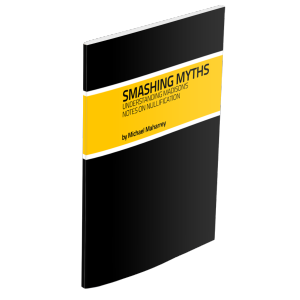Many opponents of nullification point James Madison’s 1835 Notes on Nullification and claim he opposed the doctrine in all situations.
The Madison-penned Virginia Resolutions of 1798, along with his Virginia Report of 1800, serve as foundational documents in understanding the principles of nullification. But nullification-deniers use the Notes to argue Madison didn’t mean what he appeared to say in 1798, and in fact, never supported the idea of nullification.
So, what gives? Have nullifiers misconstrued Madison’s earlier writings? Was he always opposed to state nullification? Did he do a complete 180 later in life? Or, do the opponents of nullification misconstrue his 1835 Notes?
By closely examining Madison’s Notes on Nullification through these contextual lenses, we find he was addressing a very specific situation and never renounced the basic tenants of nullification.
In 1828, Congress passed a tariff designed to protect the northern industrial economy,struggling to compete against low cost imported goods. Vice President John C. Calhoun vehemently opposed the tariff. In December 1828, he secretly wrote a pamphlet entitled South Carolina Exposition and Protest laying out the case against it. He also asserted that a state has the authority to veto – or nullify – an act of the federal government, subject to approval by ¾ of the states.
Congress eventually passed the Tariff of 1832, but it did little to relieve the burden on southern states. In response, South Carolina elected delegates to a special convention and ratified the South Carolina Ordinance of Nullification. The proclamation declared the tariffs of 1828 and 1832, “are unauthorized by the constitution of the United States, and violate the true meaning and intent thereof and are null, void, and no law, nor binding upon this State.”
To properly understand his Notes, we need to focus on exactly what Madison was opposing. He was NOT addressing nullification in the abstract, but the bastardized process of nullification concocted by Calhoun and the South Carolina nullifiers. He makes this clear early in the notes.
That the doctrine of nullification may be clearly understood it must be taken as laid down in the Report of a special committee of the House of Representatives of S. C. in 1828. In that document it is asserted, that a single State has a constitutional right to arrest the execution of a law of the U. S. within its limits; that the arrest is to be presumed right and valid, and is to remain in force unless ¾ of the States, in a Convention, shall otherwise decide.
South Carolina essentially asserted that once a single state nullified a federal act, it was annulled within that state and it could not be legally enforced there until three-quarters of the other states overruled the nullification. Furthermore, South Carolina claimed that a state’s act of nullification was “presumed right and valid” until overturned. In other words, a single state could effectively control the entire country. Representatives of the Palmetto State argued this was a “constitutional” remedy. The South Carolina version of nullification held that the state’s action legally bound the rest of the country and annulled – or made legally inoperative – the federal act within that state.
Of course, we find no such mechanism in the Constitution, and Madison rightly argued this idea was absurd.
But it follows, from no view of the subject, that a nullification of a law of the U. S. can as is now contended, belong rightfully to a single State, as one of the parties to the Constitution; the State not ceasing to avow its adherence to the Constitution. A plainer contradiction in terms, or a more fatal inlet to anarchy, cannot be imagined. [Emphasis added]
Quite simply, a single state can’t bind other political societies – not other states nor the union of states created by the Constitution. It has no legal authority to make the feds stop enforcing their acts. No mechanism exists to nullify and force others to recognize the action as right and valid.
This was the “nullification” Madison was addressing in his Notes.
So, did Madison oppose Jeffersonian Nullification as Understood in 1798?
No.
Even while arguing against South Carolina nullification, Madison continued to affirm Jeffersonian nullification in his Notes.
Thus the right of nullification meant by Mr. Jefferson is the natural right, which all admit to be a remedy against insupportable oppression. It cannot be supposed for a moment that Mr. Jefferson would not revolt at the doctrine of South Carolina, that a single state could constitutionally resist a law of the Union while remaining within it, and that with the accession of a small minority of the others, overrule the will of a great majority of the whole, & constitutionally annul the law everywhere. [Emphasis added]
When the federal government unchains itself from its constitutional restraint, the people of the states have a natural right to defend themselves and stop it.
- The Federal Loophole That Fuels Asset Forfeiture Nationwide - December 30, 2024
- Poor Richard’s Almanac: Benjamin Franklin’s Timeless Guide to Life, Liberty, and Frugality - December 27, 2024
- Anti-Federalist Objections: Pennsylvania Dissent Explained - December 16, 2024

